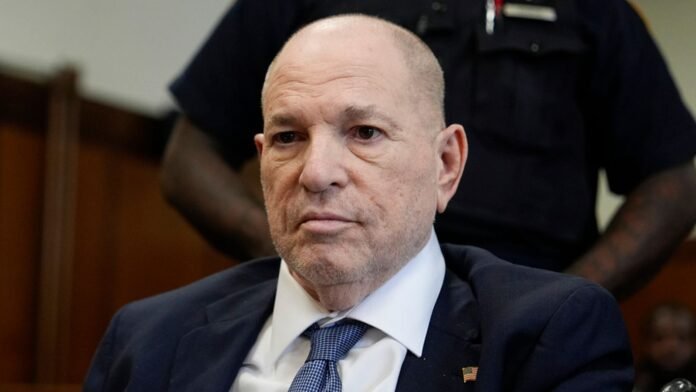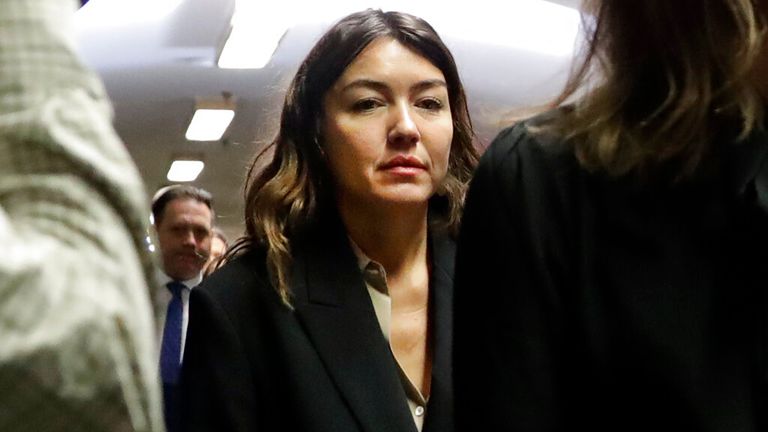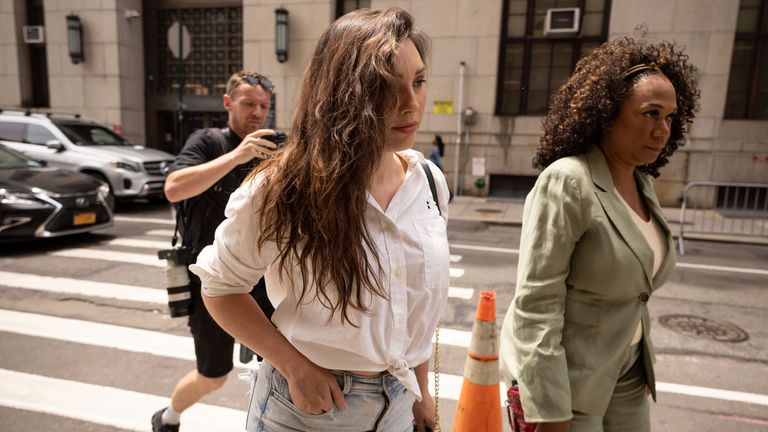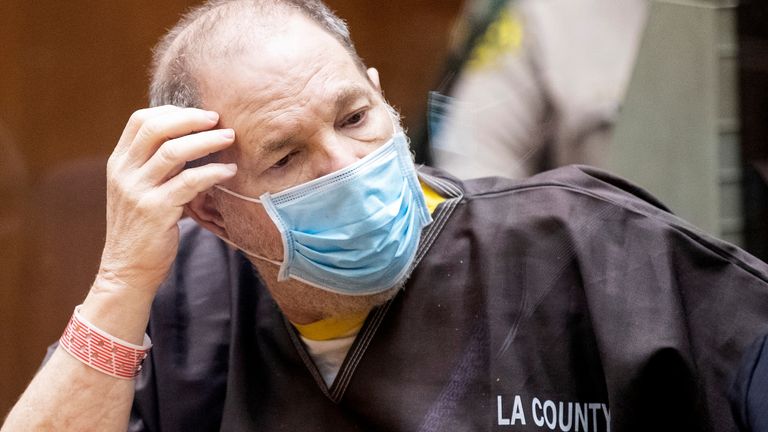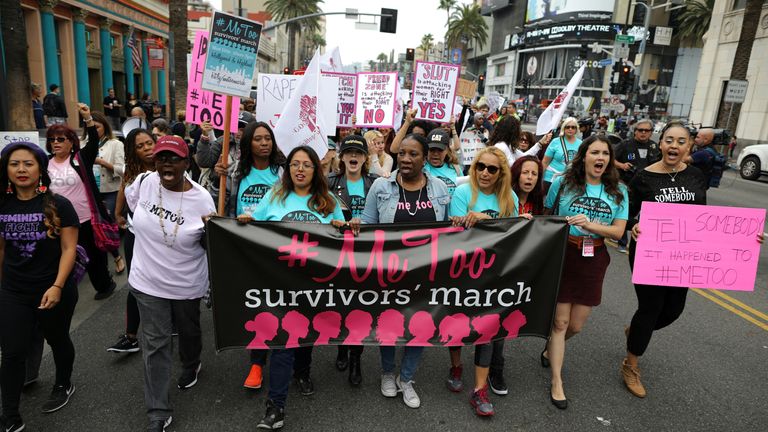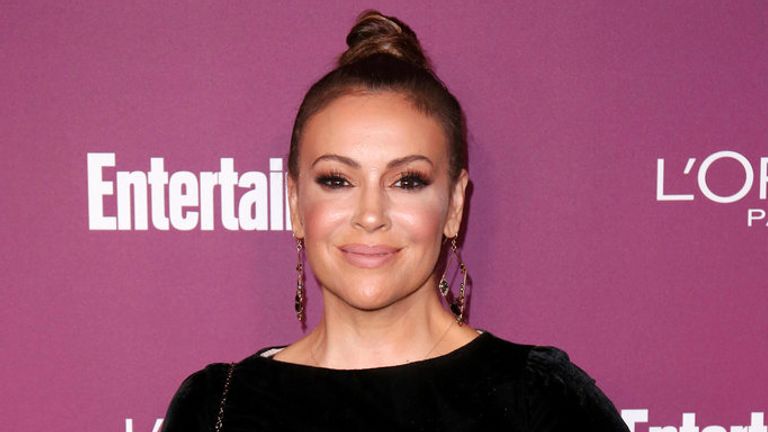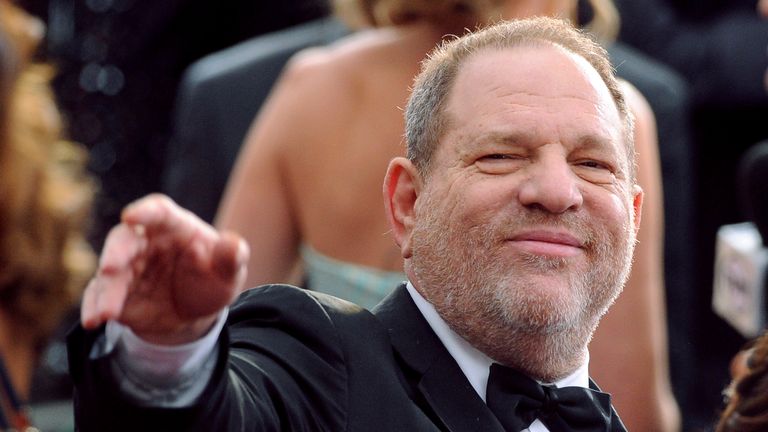Seven years after allegations against him first emerged online, Harvey Weinstein is back in court.
When the accusations surfaced in late 2017, the American actress Alyssa Milano tweeted: “If all the women who have been sexually harassed or assaulted wrote ‘Me too’ as a status, we might give people a sense of the magnitude of the problem.”
This gave birth to what we now know as the #MeToo movement and a flood of women – famous and not – sharing stories of gender-based violence and harassment.
Weinstein was jailed in 2020 and has been held at New York’s notorious Rikers Island prison complex ever since.
Today, jury selection begins for the case against the 73-year-old, where the original charges of rape and sexual assault will be heard again.
Here we look at why there’s a retrial – and why he will likely remain behind bars – and what has happened to #MeToo.
Why is there a retrial?
Weinstein is back in court because his first two convictions were overturned last April and are now being retried.
In 2020 he was sentenced to 23 years in prison after being found guilty of sexually assaulting ex-production assistant Mimi Haley in 2006 and raping former actor Jessica Mann in 2013.
But in April 2024, New York’s highest court overturned both convictions due to concerns the judge had made improper rulings, including allowing a woman to testify who was not part of the case.
At a preliminary hearing in January this year, the former Hollywood mogul, who has cancer and heart issues, asked for an earlier date on account of his poor health, however, that was denied.
Related articles
Harvey Weinstein sues his brother Bob
Harvey Weinstein rushed to hospital
When the retrial was decided upon last year, Judge Farber also ruled that a separate charge concerning a third woman should be added to the case.
In September 2024, the unnamed woman filed allegations that Weinstein forced oral sex on her at a hotel in Manhattan in 2006.
Defence lawyers tried to get the charge thrown out, claiming prosecutors were only trying to bolster their case, but Judge Farber decided to incorporate it into the current retrial.
Weinstein denies all the allegations against him and claims any sexual contact was consensual.
Why won’t he be released?
Even if the retrial ends in not guilty verdicts on all three counts, Weinstein will remain behind bars at Rikers Island.
This is because he was sentenced for a second time in February 2023 after being convicted of raping an actor in a Los Angeles hotel room in 2013.
He was also found guilty of forcible oral copulation and sexual penetration by a foreign object in relation to the same woman, named only in court as Jane Doe 1.
The judge ruled that the 16-year sentence should be served after the 23-year one imposed in New York.
Weinstein’s lawyers are appealing this sentence – but for now, the 16 years behind bars still stand.
Has #MeToo made a difference – and what’s changed?
“MeToo was another way of women testifying about sexual violence and harassment,” Dr Jane Meyrick, associate professor in health psychology at the University of West England (UWE), tells Sky News.
“It exposed the frustration around reporting cases and showed the legal system was not built to give women justice – because they just gave up on it and started saying it online instead.
“That was hugely symbolic – because most societies are built around the silencing of sexual violence and harassment.”
After #MeToo went viral in 2017, the statute of limitation on sexual assault cases was extended in several US states, giving victims more time to come forward, and there has been some reform of non-disclosure agreements (NDAs), which were regularly used by Weinstein.
This has resulted in more women speaking out and an increased awareness of gender-based violence, particularly among women, who are less inclined to tolerate any form of harassment, according to Professor Alison Phipps, a sociologist specialising in gender at Newcastle University.
“There’s been an increase in capacity to handle reports in some organisations and institutions – and we’ve seen a lot of high-profile men brought down,” she says.
“But the #MeToo movement has focused on individual men and individual cases – rather than the culture that allows the behaviour to continue.
“It’s been about naming and shaming and ‘getting rid’ of these bad men – by firing them from their jobs or creating new crimes to be able to send more of them to prison – not dealing with the problem at its root.”
Dr Meyrick, who wrote the book #MeToo For Women And Men: Understanding Power Through Sexual Harassment, gives the example of the workplace and the stereotype of “bumping the perp”, or perpetrator.
“HR departments are still not designed to protect workers – they’re built to suppress and make things go away.” As a result, she says, men are often “quietly moved on” with “no real accountability”.
The same is true in schools, Prof Phipps adds, where she believes concerns around the popularity among young boys of self-proclaimed misogynist and influencer Andrew Tate are being dealt with too “punitively”.
“The message is ‘we don’t talk about Andrew Tate here’ and ‘you shouldn’t be engaging with him’,” she says. “But what we should be doing is asking boys and young men: ‘why do you like him?’, ‘what’s going on here?’ – that deeper conversation is missing,” she says.
Have high-profile celebrity cases helped?
Both experts agree they will have inevitably empowered some women to come forward.
But they stress they are often “nothing like” most other cases of sexual violence or harassment, which makes drawing comparisons “dangerous”.
Referencing the Weinstein case in the US and Gisele Pelicot‘s in France, Dr Meyrick says: “They took multiple people over a very long period of time to reach any conviction – a lot of people’s experiences are nothing like that.”
Prof Phipps adds: “They can create an idea that it’s only ‘real’ rape if it’s committed by a serial sex offender – and not every person who perpetrates sexual harm is a serial offender.”
Part of her research has focused on ‘lad culture’ in the UK and associated sexual violence at universities.
She says: “A lot of that kind of violence happens in social spaces, where there are drugs and alcohol and young people thrown together who don’t know where the boundaries are.
“That doesn’t absolve them of any responsibility – but comparing those ‘lads’ to Harvey Weinstein seems inappropriate.”
Dr Meyrick says most victims she has spoken to through her research “wouldn’t go down the legal route” – and prosecution and conviction rates are still extremely low.
“Most don’t try for justice. They just want to be believed and heard – that’s what’s important and restorative,” she says.
But specialist services that can support victims in that way are underfunded – and not enough is being done to change attitudes through sex education and employment policy, she warns.
“Until we liberate men from the masculine roles they’re offered by society – where objectification of women is normalised as banter – they will remain healthy sons of the patriarchy.
“We need transformative, compassionate education for young men – and young women. That’s where the gap still is.”



